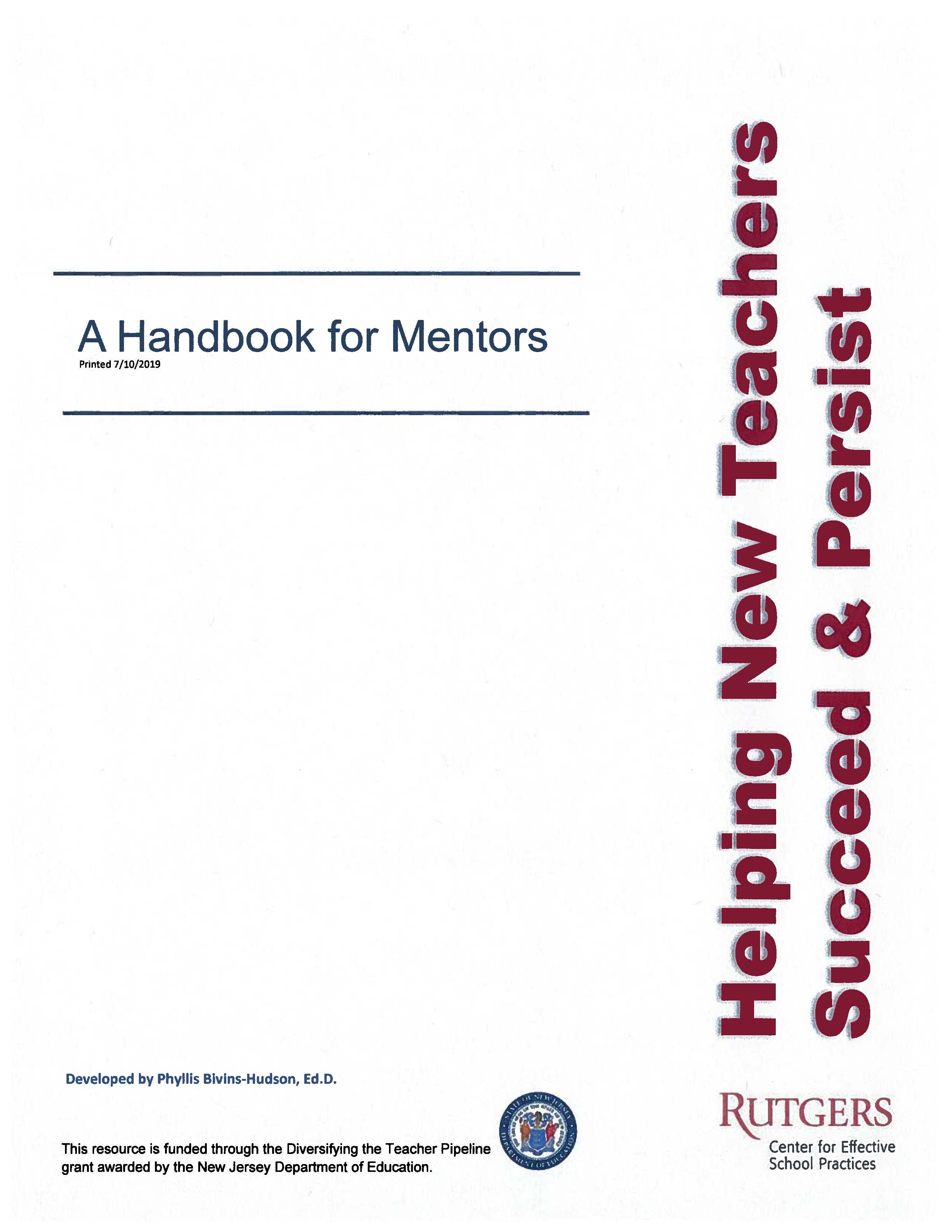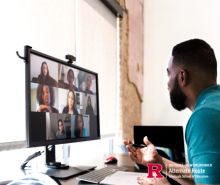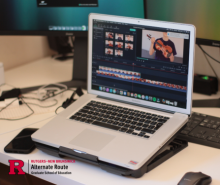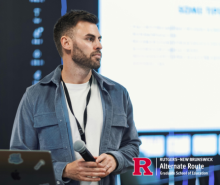NJ Educators Prepare to Mentor New Teachers During Summer Training
It’s no secret that a teacher’s first year in the classroom can be pretty overwhelming. To support new teachers through these early challenges, the Rutgers Alternate Route program is piloting a mentoring program that helps new teachers tap into classroom wisdom that has been accumulated by seasoned teachers over decades. Funded by a grant from the New Jersey Department of Education, this support comes in the form of a personal mentor within each teacher’s school, as well as the support of the larger mentoring group and a comprehensive mentor training handbook “Helping New Teachers Succeed and Persist” that contains a wealth of valuable information.
This past July, long-time Rutgers Alternate Route educator, facilitator, and trainer Dr. Phyllis Bivins-Hudson led a training for the Mentoring Program, held over two days in Passaic County. Dr. Hudson has been working in education since 1979, starting out as a classroom teacher, working on the administrative side, and ultimately receiving a doctorate in education. Now, even though she’s supposed to be retired but is “not tired,” she’s still working to help teachers get the best out of their students and themselves through part-time consulting. Dr. Hudson was a founding instructor with the Rutgers Alternate Route program in 2003, and has been working with the program since.
The training included participants from schools across New Jersey with many aspiring mentors attending from Passaic County charter schools affiliated with the grant partnership. The training was designed to bring together experienced educators to talk about what it means to be a mentor and why it’s so important, as well as offer the mentors a common language that they can share to support other teachers. The two-day workshop was strategically designed to tackle a number of areas that Dr. Hudson has seen new teachers struggle with, including:
- how to manage relationships with parents;
- how to talk to other teachers when preparing for evaluations;
- how to increase engagement in the classroom; and
- how to differentiate learning for students.
For Yanivis Hage, Chief Academic Officer at iLearn Schools which has two campuses connected with the grant, the biggest takeaway of the training was how helpful the handbook will be for both mentors and mentees. “It’s an A-Z guide for anything you need during the school year for novice teachers, breaking down the needs of new teachers based on the time of the school year. Usually, introducing all of this new information to new teachers at once can be too much. The handbook offers it out over time, which is a really great way to provide targeted support during the year without overwhelming the teachers.”
Other participants agreed that the handbook will be enormously helpful. The handbook is the culmination of Dr. Hudson’s years of trial-and-error of teaching strategies based on workshops, keeping up to date on education research, and exploring her own theories. Dr. Hudson gathered all of this information and mapped out how it should all be organized based on the New Jersey Professional Teaching standards, the needs of teachers, and the needs of mentees. As Ms. Hage noted, the handbook is organized so that topics are divided into three sections of the school year (September-November, December-March, and April-June), offering relevant advice to mentors and mentees when it’s needed most, such as addressing classroom management earlier in the school year.
Dr. Hudson believes it’s important to note that the handbook is intended to be paired with professional development, as was provided at the mentor training. “If you read the handbook without having the conversations that go along with it, there can be some confusion. The book is a handbook, but it needs to be accompanied by conversations so teachers can get an understanding of it.”
An example of a conversation that the mentors had at the training, and one that is important for all educators to have, is on cultural competency, or teachers’ ability to understand and communicate with people of different backgrounds. Dr. Hudson invited Zammeah Gibson to lead this discussion. Gibson, who is the Executive Director of the Isaiah House, has been facilitating workshops on this topic for more than a decade as a conference presenter for the Annual Rutgers Alternate Route Conference. She and Dr. Hudson strongly believe that cultural competency is critical for all teachers to understand and keep at the center of their teaching strategies. Teachers inevitably come into schools with preconceived biases and may have concepts about students or other teachers that may be wrong. A discussion at the training focused on how best to leave those biases at the door. Ultimately, this discussion covered a lot of hard topics that can be difficult for some to discuss, but it began a conversation that needs to be had among all teachers.
In all, participants found the training enormously helpful. Alban Biba, Director of the Science Department at Passaic Arts and Sciences, found the training “very interactive, targeted, organized, purposeful, and engaging.” Alban wanted to get involved with the mentor training to continue to educate himself and found that the training helped him “improve his strategy toolbox, teaching practices, and expand his network with other leaders in education.”
Kristin Hyde, first-grade teacher at Philip’s Academy Charter School in Paterson, will be mentoring two teachers in the fall. Kristin had a mentor in her first year of teaching with whom she co-taught; she described it as an amazing experience. “I received on-the-spot, immediate feedback. The open line of communication helped so much.” She had such a great experience that she wanted to give back through the Rutgers mentoring program. Kristin appreciated that the training was very hands-on as the group performed the activities the mentors are recommended to do with their mentees. Kristin also gave the handbook to her principal and sees it as an extremely helpful roadmap for her school as they expand into higher grades.
For administrators who would like to learn more about supporting new teachers using this mentoring program, the Rutgers Alternate Route program and Dr. Hudson can provide similar trainings in your local district. For a copy of the handbook, send a request to altroute@gse.rutgers.edu or keep watch for its availability on the New Jersey Department of Education website.

Email altroute@gse.rutgers.edu to request your copy.
To keep up with trainings and workshops like this in the future, be sure to follow Rutgers Alternate Route on Twitter for more information and stories from the field of education.

 Heather Ngoma has over 25 years of experience collaborating with educators across New Jersey to drive education innovation. She currently serves as the Director of the Rutgers-GSE Alternate Route Program in the Department of Learning and Teaching, a program which helps career changers, recent college graduates, and other aspiring education professionals become licensed teachers in New Jersey. Follow her on Twitter @heatherngoma.
Heather Ngoma has over 25 years of experience collaborating with educators across New Jersey to drive education innovation. She currently serves as the Director of the Rutgers-GSE Alternate Route Program in the Department of Learning and Teaching, a program which helps career changers, recent college graduates, and other aspiring education professionals become licensed teachers in New Jersey. Follow her on Twitter @heatherngoma.





